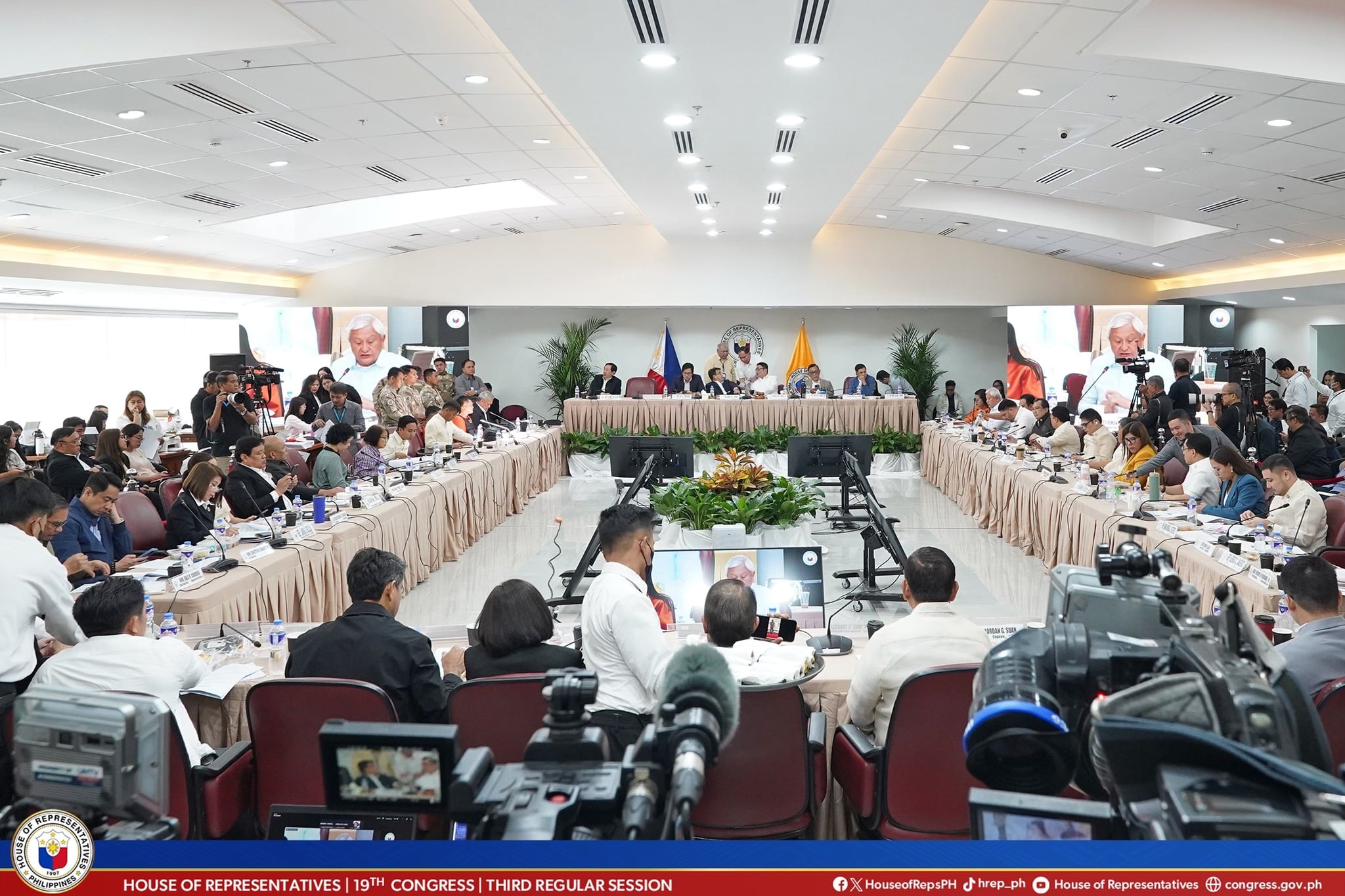
House of Representatives Quad-Committee | PHOTO: Official Facebook page of the House of Representatives
MANILA, Philippines — A bill that would adhere to President Ferdinand Marcos Jr.’s total ban on Philippine offshore gaming operators (Pogos) has been filed in the House of Representatives.
Before the House’s quad committee started its hearing on Friday, committee chairpersons and key members filed House Bill No. 10987, or the proposed Anti-Offshore Gaming Operations Act.
Under the bill, Marcos’ order of a total ban would be reinforced by outlawing Pogos and revoking all contracts of Pogo hubs, in a bid to ensure public safety and national security
“Any provision of existing laws to the contrary notwithstanding, all licenses or franchises issued to any person or entity, including gaming agents and service providers, by the Philippine Amusement and Gaming Corporation (Pagcor), Cagayan Economic Zone Authority (Ceza), Aurora Pacific Economic Zone and Freeport Authority (Apeco) and Authority of the Freeport Area of Bataan (Afab), to conduct offshore gaming operation in the country are hereby deemed withdrawn, revoked or cancelled,” the bill read.
“The Pagcor, Ceza, Apeco, Afab and other regulatory government agencies authorized to operate and license gambling casinos, gaming clubs and other similar recreation or amusement places and gaming pools are prohibited to issue any license or permit for offshore gaming operations,” it added.
The following acts are considered prohibited if the bill is approved and enacted into law:
- Facilitate offshore gaming through any means or device
- Accept any form of betting for offshore gaming operations
- Operate as a service provider of any component of offshore gaming operations
- Construct or maintain any operation hub or a structural complex that houses the operations and logistical, administrative, and support services for offshore gaming
- Establish any gaming laboratory or provide services as a gaming laboratory
- Possess any offshore gaming paraphernalia
- Aid, protect, or abet the conduct of any of the above-mentioned acts
“It is necessary to enact a law to ensure that anti-Pogo measures are institutionalized, thus, this proposed measure,” the authors said.
Among the authors of the bill are Senior Deputy Speaker Aurelio Gonzales Jr., , Deputy Speaker David Suarez, and the four quad-committee chairpersons — Surigao del Norte 2nd District Rep. Robert Ace Barbers (dangerous drugs), Santa Rosa City Rep. Dan Fernandez (public order and safety), Abang Lingkod party-list Rep. Joseph Stephen Paduano (public accounts), and Manila 6th District Rep. Bienvenido Abante Jr. (human rights).
They were joined by other key members of the quad committee, notably Reps. Romeo Acop, Johnny Pimentel, Gerville Luistro, Ramon Rodrigo Gutierrez, Paolo Ortega V, Jay Khonghun, and Jonathan Keith Flores.
Pogos were one of the topics investigated by the quad committee, along extrajudicial killings in the past administration’s drug war, and the illicit drug trade. Over the past few years, several Pogo hubs — like the one in Porac, Pampanga, and Bamban, Tarlac — were raided due to reports of kidnapping, illegal detention, human trafficking, prostitution, and even arbitrary killing.
There were also theories that money from Pogos and some lottery games were used to give rewards to police officers who would kill drug suspects. Furthermore, there have been concerns about Pogos being used to compromise the Philippines’ national security.
READ: Espenido told: Pogo money used to reward anti-drug units
“Several raids conducted by law enforcement agencies on illegal Pogo hubs reveal cases of kidnapping, illegal detention, human trafficking, prostitution, and torture,” the bill’s authors said.
“Further, the authorities suspect that illegal Pogos are likewise involved in cybercrime, investment scam, money laundering, tax evasion and other fraudulent practices,” they added.
Earlier, the same lawmakers filed House Bill No. 10986 or the proposed Anti-Extrajudicial Killing Act. According to the bill’s authors, the proposed measure was crafted based on the quad committee’s findings and recommendations, which has investigated different EJKs.
“Extrajudicial killing or the killing of individuals without judicial proceedings or legal authority, poses a grave threat to the rule of law, democracy and the protection of human rights,” the bill’s explanatory note stated. “These acts bypass established judicial procedures, undermining public trust in the justice system and violating the basic rights to life and due process guaranteed by the Constitution.
“The lack of accountability for such crimes contributes to a culture of impunity, where perpetrators believe they can act without fear of legal consequences. This bill seeks to explicitly criminalize EJK, ensuring that any individual, regardless of rank or position, who is found guilty of participating in, authorizing, or condoning such acts will face appropriate criminal penalties,” it added.
READ: Quad comm heads file bill defining extrajudicial killings as heinous crimes
Previously, Barbers assured critics that the quad committee investigation remains in aid of legislation, as the end goal of the discussions is to amend existing laws or suggest new ones.
READ: End goal is to propose new laws, amendments – Barbers
Then during the quad committee hearing last September 27, Barbers mentioned a list of laws that may need amending, which will form part of the panel’s committee report. One of the bills that the panel may suggest, according to Barbers, is the revival of death penalty for heinous crimes.